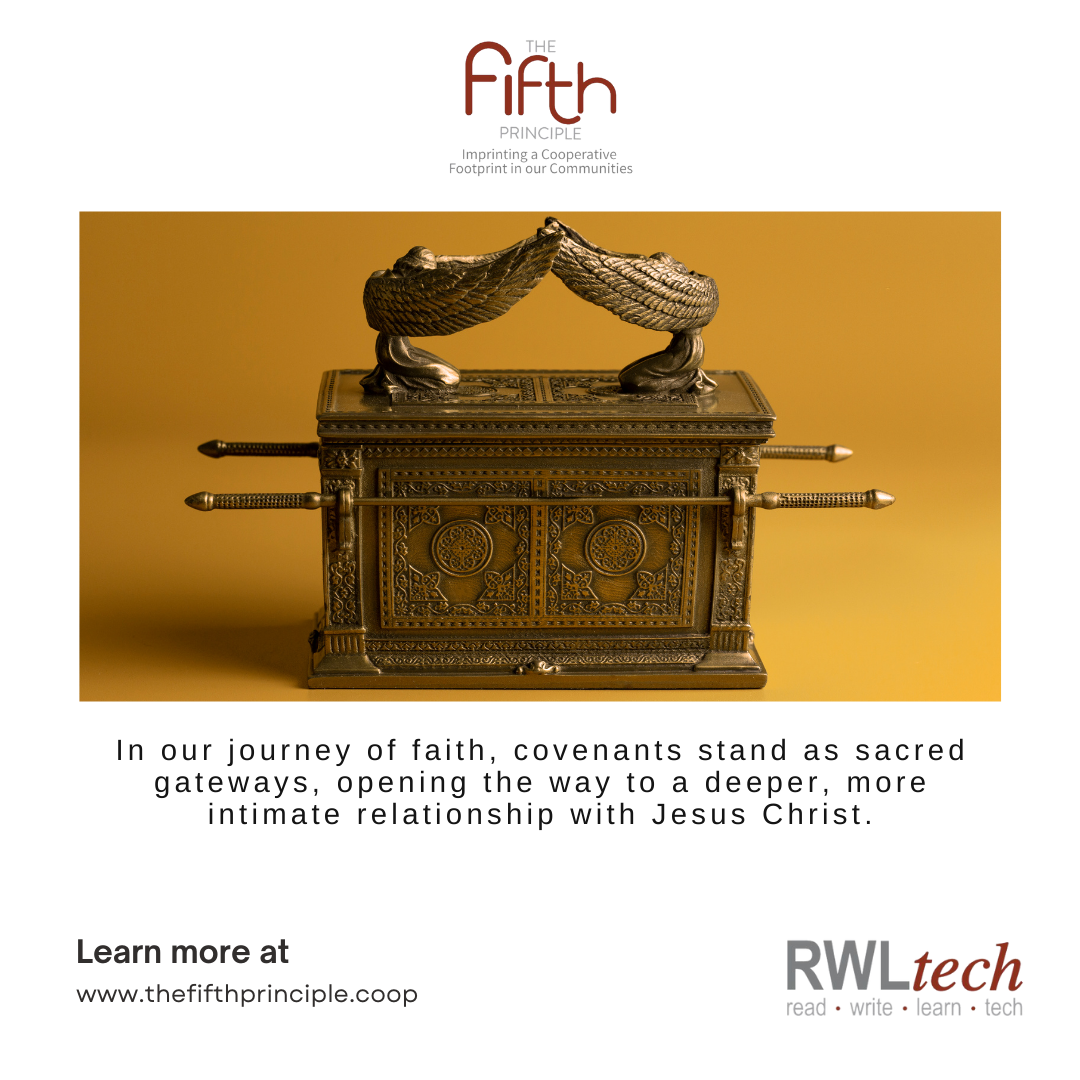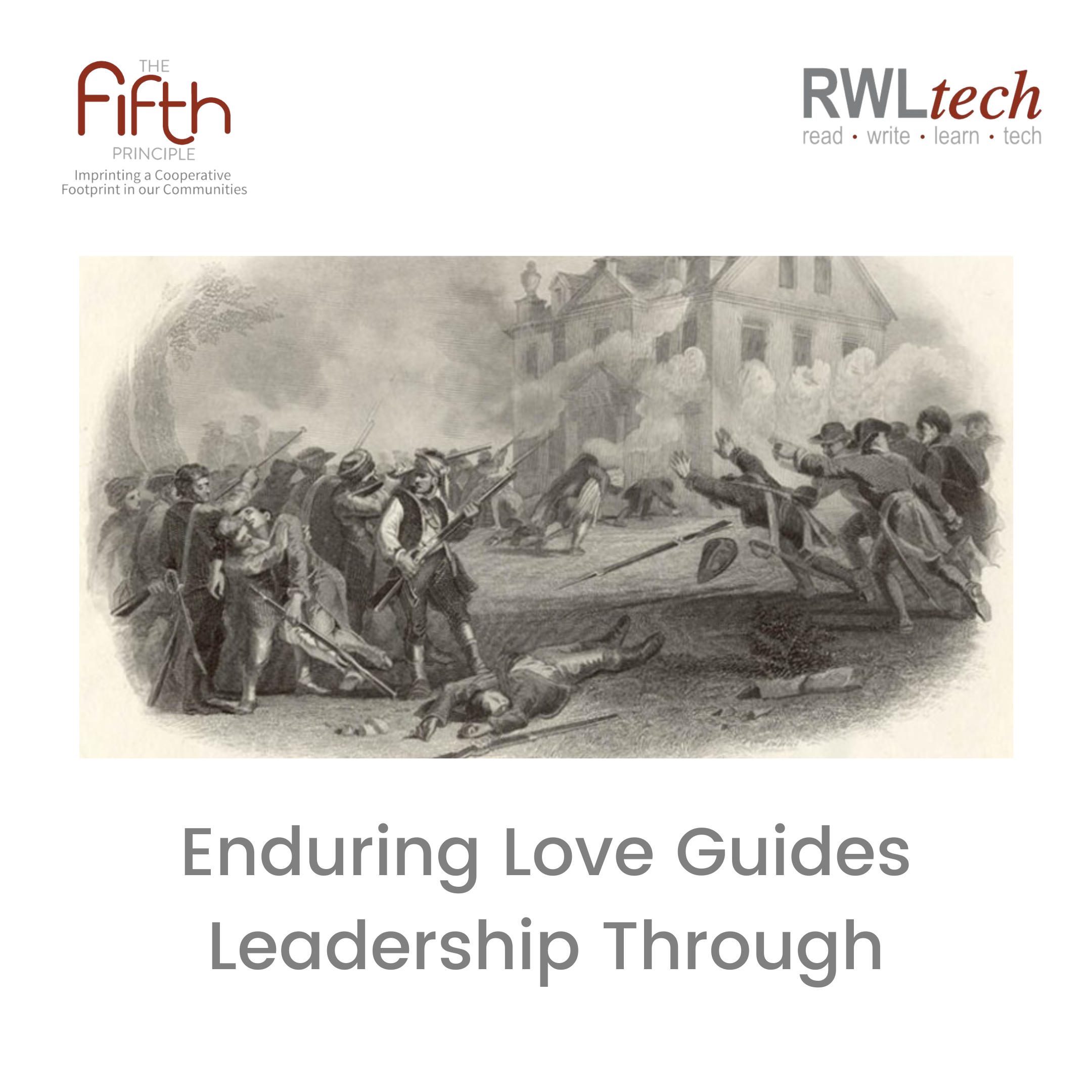🌟 Discovering the Path to Christ Through Covenants 🌟
In our journey of faith, covenants stand as sacred gateways, opening the way to a deeper, more intimate relationship with Jesus Christ. These divine promises are not just formal agreements; they are the heartbeats of our spiritual life, pulsating with the love and commitment we share with our Savior.
🕊️ At the core of these covenants lies the principle of sacrifice, a testament to our devotion and a stepping stone to true obedience. When we make sacrifices, whether they be of our time, our talents, or our worldly comforts, we are not just performing acts of devotion; we are aligning our will with God's. This alignment is where the magic happens - it transforms our ordinary efforts into extraordinary journeys of faith.
🌱 Obedience, born from sacrifice, nurtures our covenants. It allows them to grow, flourish, and bear the fruits of spiritual knowledge and understanding. Through this obedience, we come to know Christ not just as a figure in the scriptures but as a constant presence in our lives. We begin to see His hand in our daily experiences, feel His love in our trials, and hear His voice in our moments of quiet reflection.
💫 Embracing our covenants through sacrifice and obedience is more than just following a divine directive. It's about building a relationship with Jesus Christ, one where we come to know Him intimately and personally.
Let's commit to our covenants with our whole hearts and embark on this beautiful journey of drawing closer to Christ.
✍️Learn about historical events that shape our future. Flashback to a Fabulous Future.
✍️ Contact us to learn more about our Faith and Freedom historical tours for you and/or your group.
http://www.respitefromreality.com/
✍️ Join our Bible Study Group. It is called Faith and Freedom – A Recipe for Restoration. Study the Bible through the lens of our Founding Fathers. We use David Barton’s Founder’s Bible when we meet once a week on Sundays at 6:00 p.m. Eastern. There is no charge for this class.
#HomesSchool, #History, #UnitedStates, #Consitution, #FoundingFathers, #Travel, #Tour, #Historical, #Family, #Bible, #Biblical, #Faith #FaithJourney #CovenantPath #Sacrifice #Obedience #KnowingChrist #SpiritualGrowth 🙏✨
People
Circles
Posts
🌟 Cultivating a Miracle-Producing Faith 🌟
In our spiritual walk, one of the most profound quests we embark on is developing a faith so strong, it becomes the fertile ground from which miracles can sprout. But how do we nurture this kind of faith, the type that moves mountains and changes the course of our lives?
🌱 Start Small, Dream Big: Miraculous faith begins like a mustard seed – tiny, yet potent. Allow your faith to start small; let it be sincere and true, even if it's just a glimmer. Dream big and believe that your faith has the power to grow and manifest miracles.
💪 Exercise Your Faith Muscle: Just like a muscle, faith strengthens with use. Exercise your faith through daily acts of trust in God’s plan, especially in challenging times. Every act of faith, no matter how small, builds resilience and fortitude.
📖 Immerse Yourself in the Word: The scriptures are replete with stories of faith and miracles. Immerse yourself in these stories. Let them inspire and increase your understanding of what faith can achieve.
🙏 Persistent Prayer: Engage in persistent, heartfelt prayer. Communicate with God not just in times of need, but as a constant practice. Remember, prayer is the breath of faith.
👣 Follow Righteous Examples: Surround yourself with examples of strong faith. Whether it's biblical characters, historical figures, or people in your community, let their experiences guide and encourage you.
🤲 Be Open to Receive: Often, we ask for miracles, but our hearts are not fully open to receive them. Cultivate a heart that is ready to embrace the blessings and answers God provides, in whatever form they come.
🌈 Practice Gratitude: Recognize and give thanks for the miracles already present in your life, no matter how small they may seem. Gratitude opens your eyes to God's work and increases your faith.
Remember, faith capable of yielding miracles doesn’t happen overnight. It’s a journey of constant growth, unwavering trust, and steadfast commitment. Let's walk this path with hope and anticipation, ready to witness the wondrous ways in which our faith can move mountains.
✍️Learn about historical events that shape our future. Flashback to a Fabulous Future.
✍️ Contact us to learn more about our Faith and Freedom historical tours for you and/or your group.
http://www.respitefromreality.com/
✍️ Join our Bible Study Group. It is called Faith and Freedom – A Recipe for Restoration. Study the Bible through the lens of our Founding Fathers. We use David Barton’s Founder’s Bible when we meet once a week on Sundays at 6:00 p.m. Eastern. There is no charge for this class.
#MiracleFaith #SpiritualGrowth #TrustInGod #FaithJourney #BelieveInTheMiraculous #HomeSchool, #History, #UnitedStates, #Consitution, #FoundingFathers, #Travel, #Tour, #Historical, #Family, #Bible, #Biblical, #Faith
🌈 The Blessings of Heaven Through Sacrifice 🌈
In our sacred walk with Christ, as we delve deeper into the meaning and practice of sacrifice, we unlock a profound truth: sacrifice is not only an offering but a channel through which the blessings of heaven flow into our lives.
🌟 When we sacrifice, we do more than give something up; we open our hearts and lives to the abundance of God's grace. It's a powerful exchange – our acts of surrender for His infinite blessings. These blessings may not always be material; often, they are the peace that surpasses understanding, the strength to endure trials, and the joy of divine love.
💪 Each act of sacrifice, be it big or small, is a seed planted in the fertile soil of faith. And from these seeds grow the miracles of our lives – transformations, healings, and moments of divine intervention. It's in these moments of giving up something valuable for something greater that we truly experience the hand of God moving in our lives.
🙏 Let us embrace sacrifice as a joyful offering, knowing that it paves the way for heavenly blessings. As we continue to walk in obedience and uphold our covenants, let us do so with the expectation that our sacrifices will bring forth the rich, fulfilling blessings that only heaven can bestow.
Delve into the deep covenants of faith, understand the sacrifices that shaped our foundations, and connect with Christ in a way that transforms your life.
✍️Learn about historical events that shape our future. Flashback to a Fabulous Future.
✍️ Contact us to learn more about our Faith and Freedom historical tours for you and/or your group.
http://www.respitefromreality.com/
✍️ Join our Bible Study Group. It is called Faith and Freedom – A Recipe for Restoration. Study the Bible through the lens of our Founding Fathers. We use David Barton’s Founder’s Bible when we meet once a week on Sundays at 6:00 p.m. Eastern. There is no charge for this class.
#HeavenlyBlessings #PowerOfSacrifice #FaithInAction #DivineExchange #HomeSchool, #History, #UnitedStates, #Consitution, #FoundingFathers, #Travel, #Tour, #Historical, #Family, #Bible, #Biblical, #Faith
Videos
People
Circles
Videos
Posts
🌟 Discovering the Path to Christ Through Covenants 🌟
In our journey of faith, covenants stand as sacred gateways, opening the way to a deeper, more intimate relationship with Jesus Christ. These divine promises are not just formal agreements; they are the heartbeats of our spiritual life, pulsating with the love and commitment we share with our Savior.
🕊️ At the core of these covenants lies the principle of sacrifice, a testament to our devotion and a stepping stone to true obedience. When we make sacrifices, whether they be of our time, our talents, or our worldly comforts, we are not just performing acts of devotion; we are aligning our will with God's. This alignment is where the magic happens - it transforms our ordinary efforts into extraordinary journeys of faith.
🌱 Obedience, born from sacrifice, nurtures our covenants. It allows them to grow, flourish, and bear the fruits of spiritual knowledge and understanding. Through this obedience, we come to know Christ not just as a figure in the scriptures but as a constant presence in our lives. We begin to see His hand in our daily experiences, feel His love in our trials, and hear His voice in our moments of quiet reflection.
💫 Embracing our covenants through sacrifice and obedience is more than just following a divine directive. It's about building a relationship with Jesus Christ, one where we come to know Him intimately and personally.
Let's commit to our covenants with our whole hearts and embark on this beautiful journey of drawing closer to Christ.
✍️Learn about historical events that shape our future. Flashback to a Fabulous Future.
✍️ Contact us to learn more about our Faith and Freedom historical tours for you and/or your group.
http://www.respitefromreality.com/
✍️ Join our Bible Study Group. It is called Faith and Freedom – A Recipe for Restoration. Study the Bible through the lens of our Founding Fathers. We use David Barton’s Founder’s Bible when we meet once a week on Sundays at 6:00 p.m. Eastern. There is no charge for this class.
#HomesSchool, #History, #UnitedStates, #Consitution, #FoundingFathers, #Travel, #Tour, #Historical, #Family, #Bible, #Biblical, #Faith #FaithJourney #CovenantPath #Sacrifice #Obedience #KnowingChrist #SpiritualGrowth 🙏✨
🌟 Cultivating a Miracle-Producing Faith 🌟
In our spiritual walk, one of the most profound quests we embark on is developing a faith so strong, it becomes the fertile ground from which miracles can sprout. But how do we nurture this kind of faith, the type that moves mountains and changes the course of our lives?
🌱 Start Small, Dream Big: Miraculous faith begins like a mustard seed – tiny, yet potent. Allow your faith to start small; let it be sincere and true, even if it's just a glimmer. Dream big and believe that your faith has the power to grow and manifest miracles.
💪 Exercise Your Faith Muscle: Just like a muscle, faith strengthens with use. Exercise your faith through daily acts of trust in God’s plan, especially in challenging times. Every act of faith, no matter how small, builds resilience and fortitude.
📖 Immerse Yourself in the Word: The scriptures are replete with stories of faith and miracles. Immerse yourself in these stories. Let them inspire and increase your understanding of what faith can achieve.
🙏 Persistent Prayer: Engage in persistent, heartfelt prayer. Communicate with God not just in times of need, but as a constant practice. Remember, prayer is the breath of faith.
👣 Follow Righteous Examples: Surround yourself with examples of strong faith. Whether it's biblical characters, historical figures, or people in your community, let their experiences guide and encourage you.
🤲 Be Open to Receive: Often, we ask for miracles, but our hearts are not fully open to receive them. Cultivate a heart that is ready to embrace the blessings and answers God provides, in whatever form they come.
🌈 Practice Gratitude: Recognize and give thanks for the miracles already present in your life, no matter how small they may seem. Gratitude opens your eyes to God's work and increases your faith.
Remember, faith capable of yielding miracles doesn’t happen overnight. It’s a journey of constant growth, unwavering trust, and steadfast commitment. Let's walk this path with hope and anticipation, ready to witness the wondrous ways in which our faith can move mountains.
✍️Learn about historical events that shape our future. Flashback to a Fabulous Future.
✍️ Contact us to learn more about our Faith and Freedom historical tours for you and/or your group.
http://www.respitefromreality.com/
✍️ Join our Bible Study Group. It is called Faith and Freedom – A Recipe for Restoration. Study the Bible through the lens of our Founding Fathers. We use David Barton’s Founder’s Bible when we meet once a week on Sundays at 6:00 p.m. Eastern. There is no charge for this class.
#MiracleFaith #SpiritualGrowth #TrustInGod #FaithJourney #BelieveInTheMiraculous #HomeSchool, #History, #UnitedStates, #Consitution, #FoundingFathers, #Travel, #Tour, #Historical, #Family, #Bible, #Biblical, #Faith
🌈 The Blessings of Heaven Through Sacrifice 🌈
In our sacred walk with Christ, as we delve deeper into the meaning and practice of sacrifice, we unlock a profound truth: sacrifice is not only an offering but a channel through which the blessings of heaven flow into our lives.
🌟 When we sacrifice, we do more than give something up; we open our hearts and lives to the abundance of God's grace. It's a powerful exchange – our acts of surrender for His infinite blessings. These blessings may not always be material; often, they are the peace that surpasses understanding, the strength to endure trials, and the joy of divine love.
💪 Each act of sacrifice, be it big or small, is a seed planted in the fertile soil of faith. And from these seeds grow the miracles of our lives – transformations, healings, and moments of divine intervention. It's in these moments of giving up something valuable for something greater that we truly experience the hand of God moving in our lives.
🙏 Let us embrace sacrifice as a joyful offering, knowing that it paves the way for heavenly blessings. As we continue to walk in obedience and uphold our covenants, let us do so with the expectation that our sacrifices will bring forth the rich, fulfilling blessings that only heaven can bestow.
Delve into the deep covenants of faith, understand the sacrifices that shaped our foundations, and connect with Christ in a way that transforms your life.
✍️Learn about historical events that shape our future. Flashback to a Fabulous Future.
✍️ Contact us to learn more about our Faith and Freedom historical tours for you and/or your group.
http://www.respitefromreality.com/
✍️ Join our Bible Study Group. It is called Faith and Freedom – A Recipe for Restoration. Study the Bible through the lens of our Founding Fathers. We use David Barton’s Founder’s Bible when we meet once a week on Sundays at 6:00 p.m. Eastern. There is no charge for this class.
#HeavenlyBlessings #PowerOfSacrifice #FaithInAction #DivineExchange #HomeSchool, #History, #UnitedStates, #Consitution, #FoundingFathers, #Travel, #Tour, #Historical, #Family, #Bible, #Biblical, #Faith
The Revolution’s Intimate Toll - The Untold Story Through the Eyes of Henry and Lucy Knox
The Human Cost of a Nation's Birth
The American Revolution, a pivotal chapter in history, is frequently depicted through its battles, declarations, and political upheavals. However, the personal narratives of those who lived through it, like Henry and Lucy Knox, reveal a more intimate and often untold aspect of this historical event. Their letters provide a unique lens into the personal sacrifices, emotional turmoil, and resilient spirit that underpinned the fight for independence.
The Knox Correspondence: A Window to War's Personal Impact
Henry and Lucy Knox's letters during the Revolutionary War era are more than mere historical documents. They are poignant testaments to the emotional landscape of a nation in the throes of birth. Each letter encapsulates the hopes, fears, and undying love of a couple caught in the midst of a tumultuous time.
For Henry, an artillery commander closely aligned with George Washington, the war was not just a battlefield engagement; it was a constant struggle between duty and the longing for family life. His letters often reflect a deep sense of responsibility towards the revolutionary cause, juxtaposed with a yearning to return to his beloved wife and children.
Lucy, on the other hand, faced her own battles on the home front. Her letters paint a picture of a woman grappling with the daily realities of war - shortages of food and supplies, the constant fear for her husband’s safety, and the loneliness of separation. Her words offer a rare glimpse into the life of a woman whose world was turned upside down by the political tides of the time.
Love, Loneliness, and Loyalty in Times of War
The Knoxes' correspondence reveals the profound emotional toll of the war. Lucy’s letters often oscillate between expressions of deep love for Henry and expressions of loneliness and despair over his absence. "How horrid is this war, Brother against Brother and the parent against the child," she writes, encapsulating the internal conflict many families experienced as loyalties were divided.
Henry's responses, although sometimes delayed due to the chaos of war, always conveyed his unwavering affection and a shared longing for a peaceful future together. His words often served as a beacon of hope for Lucy, a reminder of the life they were fighting to build.
Beyond the Battlefield: The Home Front's Invisible Struggle
While Henry’s military endeavors are well-documented, Lucy's struggles represent the untold stories of many women during the Revolution. With men away at war, women like Lucy were thrust into roles of managing households, raising children alone, and coping with economic and social upheaval. Their resilience and resourcefulness were vital yet often unrecognized cogs in the machinery of the revolutionary effort.
Legacy of the Letters: Lessons from the Past
The Knoxes' correspondence offers more than just a historical account; it provides timeless lessons about love, resilience, and sacrifice. It reminds us that behind every historical event, there are personal stories of individuals whose lives were irrevocably altered. The intimate toll of the American Revolution, as experienced by Henry and Lucy Knox, teaches us about the human cost of freedom and the enduring strength of the human spirit in the face of adversity.
As we remember the American Revolution for its historical significance, let us also acknowledge the personal narratives that offer a more complete understanding of this transformative period. The letters of Henry and Lucy Knox serve as a powerful reminder of the intimate toll and enduring legacy of one of history’s most pivotal events.
Do you want to learn more about what you can do to act NOW! and save our Constitution.
https://www.thefifthprinciple.coop/wcid.html
Take your learning to the next level:
✍️Learn about historical events that shape our future. Flashback to a Fabulous Future.
https://www.voiceamerica.com/show/4117/flashback-to-a-fabulous-future
✍️ Join our Bible Study Group. It is called Faith and Freedom – A Recipe for Restoration. Study the Bible through the lens of our Founding Fathers. We use David Barton’s Founder’s Bible when we meet once a week on Sundays at 6:00 p.m. Eastern. There is no charge for this class.
https://thefoundersbible.com/
✍️ What is Quiet Leadership? Why is it important now more than ever -- couple it with Servant Leadership and Conscious Leadership and you will have principled leaders who can navigate the turbulent waters ahead! Join us for a four-week FREE journey. One to two hours a week!
https://seasaltlearning.com/quiet-leadership-journey/?mc_cid=24588f1243&mc_eid=369d7064bd
#HomesShool, #History, #UnitedStates, #Consitution, #FoundingFathers, #Travel, #Tour, #Historical, #Family, #Bible, #Biblical, #Faith
When Knox was named Secretary of War, his wife Lucy predicted tough work rebuilding America after the battles. She grasped the unstable challenges imperiling the hard-won nation. Though battle-wearied, the partners' service continued - love drove them to lead the war's difficult aftermath, no matter the burden.
https://rumble.com/v2b9eqw-servant-leadership.html
Do you want to learn more about what you can do to act NOW! and save our Constitution.
https://www.thefifthprinciple.coop/wcid.html
Take your learning to the next level:
✍️Learn about historical events that shape our future. Flashback to a Fabulous Future.
https://www.voiceamerica.com/show/4117/flashback-to-a-fabulous-future
✍️ Join our Bible Study Group. It is called Faith and Freedom – A Recipe for Restoration. Study the Bible through the lens of our Founding Fathers. We use David Barton’s Founder’s Bible when we meet once a week on Sundays at 6:00 p.m. Eastern. There is no charge for this class.
https://thefoundersbible.com/
✍️ What is Quiet Leadership? Why is it important now more than ever -- couple it with Servant Leadership and Conscious Leadership and you will have principled leaders who can navigate the turbulent waters ahead! Join us for a four-week FREE journey. One to two hours a week!
https://seasaltlearning.com/quiet-leadership-journey/?mc_cid=24588f1243&mc_eid=369d7064bd
#HomesShool, #History, #UnitedStates, #Consitution, #FoundingFathers, #Travel, #Tour, #Historical, #Family, #Bible, #Biblical, #Faith






